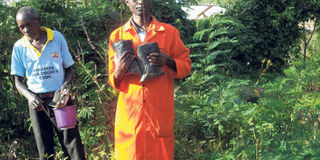Why not grow your money on trees

Jacktone Kube (left) and his nephew Charles Butiko show gravellia and eucalyptus seedlings they plant in Vihiga.
EVERLINE OKEWO | NATION MEDIA GROUP
What you need to know:
- While eucalyptus is his mainstay, other trees and their seedlings that he grows are cypress, kei apple, causurina, gravellia, bisovia, bottle brush white, yellow and red, jatropha, jacaranda and tithonia.
- He has three eucalyptus nurseries and in each he has planted a kilo of the seeds, which produce between 5,000 and 6,000 seedlings.
- The chemical engineering graduate says the challenges in the sector include diseases such as wilting and pests.
Jacktone Kube’s love for nature is apparent as one enters his home in Luanda, Vihiga County.
The home is awash with trees of various species at different stages of growth.
While he has grown some of the trees for aesthetic purposes, majority of them are for sale.
The farmer has on three-and-a-half acres about 4,500 assorted trees that include eucalyptus (blue gum), which are used to make poles. The trees mature in five to seven years after transferring them from the nursery.
“Currently I have more than 1,000 mature eucalyptus trees which are ready for sell. I sell each at between Sh3,000 and Sh5,000 depending on the size,” says Kube, who also grows a variety of tree seedlings.
While eucalyptus is his mainstay, other trees and their seedlings that he grows are cypress, kei apple, causurina, gravellia, bisovia, bottle brush white, yellow and red, jatropha, jacaranda and tithonia.
According to the farmer, eucalyptus is the fastest growing exotic tree and has the highest demand.
He has three eucalyptus nurseries and in each he has planted a kilo of the seeds, which produce between 5,000 and 6,000 seedlings. The farmer has 20 nurseries in total that host over 400,000 tree seedlings of different species. He sells each of the seedlings from Sh5 to Sh20 depending on the size and type.
Gravellia seeds are the most expensive, according to the farmer. Just as for eucalyptus, a kilo of gravellia seeds goes for Sh7,000 at the Kenya Forestry Research Institute (Kefri) in Maseno, where he buys them.
GREEN KENYA
The farmer planted a kilo of them in two nurseries two weeks ago and he now expects 6,000 seedlings in six weeks.
Kube, who engages in the business under the name Green Kenya, which he has registered as a community based organisation, started the venture in 2007 having retired as a chemistry and biology teacher in 2006.
To start, he invested in the business Sh300,000, part of his retirement package, which he used to buy seeds and prepare the farm.
He followed in the footsteps of his cousin, who had been planting tree seedlings for years.
“Tree farming is far much better than maize, which is the main crop here. Although I plant maize and keep animals, they do not bring me much.”
Kube, who makes an average of Sh100,000 a month from selling mature trees and seedlings, says earnings from the venture are higher than those from food crops.
“You can raise 100,000 tree seedlings on half-an-acre. If you sell each at Sh10, you easily make Sh1 million in less than a year. But for maize, you get five to 10 bags from half-an-acre. At about Sh2,500 per bag, you will be lucky if you earn Sh50,000 per season.” Kube sells the trees and seedlings to schools, hospitals, individuals and the Constituency Development Fund (CDF) office buys regularly for its various activities.
The farmer, who sells at least 10,000 seedlings in a month and has employed five workers, has joined hands with his cousin David Etale, who has 80,000 trees, to start an initiative dubbed Retire na Miti, which encourages retirees to venture into tree farming.
“We identify high value trees and mobilise farmers to plant them for sale through the organisation,” says Charles Butiko, a member of Green Kenya who has planted 500 eucalyptus trees on his quarter-acre in Luanda.
CHEMICAL ENGINEERING GRADUATE
The chemical engineering graduate says the challenges in the sector include diseases such as wilting and pests.
“Insects like snout beetles can decimate acres of young eucalyptus trees,” he says, adding that market for mature trees is also a challenge. Currently they rely on tree merchants (brokers) who buy from them at Sh5,000 and sell to Kenya Power at a higher price.
Prof Julius Nyabundi, an expert in agronomy and the Principal of Murang’a University College, says trees are economically viable, particularly in areas like Vihiga, which is hilly.
“My advice to farmers is to do a comparison of the yield they would get when they plant a tree or any other food crop like say maize on a space of about an acre and then decide,” says Prof Nyabundi.
His counterpart, Prof Okeyo Owuor, an environmental science expert at Rongo University College notes that tree farming is a viable project when done alongside other activities such as dairy animal production.
“Eucalyptus fetches higher prices because of its vast uses that include in energy and construction sectors.”
However, he warns that when planted near rivers or streams, the tree can dry the water body in a few years. “You can never reclaim the soil fertility if you plant eucalyptus on your farm,” he warns as he isolates causurina as one the best tree species since it does not degrade the soil.





